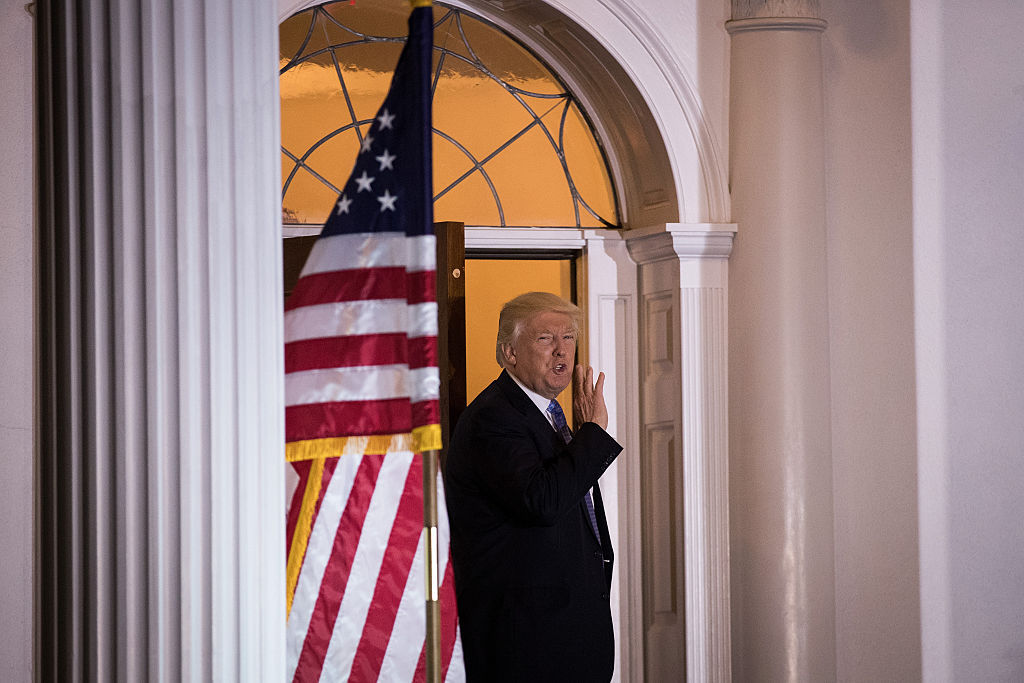Donald Trump baselessly blames historic popular-vote loss on 'millions' of illegal voters


A free daily email with the biggest news stories of the day – and the best features from TheWeek.com
You are now subscribed
Your newsletter sign-up was successful
President-elect Donald Trump spent Saturday and early Sunday tweeting about how a recount in Wisconsin and possible recounts or vote audits in Michigan and Pennsylvania are a "scam" that will change "nothing" about his victory in the Electoral College, then shifted later Sunday to tweeting about how illegal voters deprived him of a popular win, too. Hillary Clinton currently has more than 2.2 million more votes than Trump. "I won the popular vote if you deduct the millions of people who voted illegally," Trump tweeted, specifically alleging "serious voter fraud in Virginia, New Hampshire, and California."
Washington Post fact-checker Glenn Kessler gave Trump's assertion of millions of illegal votes "Four Pinocchios," calling it "a bogus claim with no documented proof." ProPublica, which monitored polls and reports of voting problems, says there is no evidence of widespread voter fraud. The claim apparently began with one person on Twitter and was picked up by the fringe Alex Jones site Infowars.
On Sunday talk shows, Trump transition senior adviser Kellyanne Conway criticized "the Hillary people" for participating in the state recounts, requested and paid for by Green Party nominee Jill Stein, calling Clinton and Stein "a bunch of crybabies and sore losers" who "can't accept reality."
The Week
Escape your echo chamber. Get the facts behind the news, plus analysis from multiple perspectives.

Sign up for The Week's Free Newsletters
From our morning news briefing to a weekly Good News Newsletter, get the best of The Week delivered directly to your inbox.
From our morning news briefing to a weekly Good News Newsletter, get the best of The Week delivered directly to your inbox.
In Wisconsin, Trump won by fewer than 22,000 votes, or less than 1 percent of the state's votes. In Michigan, Trump leads Clinton by about 11,000 votes, or 0.22 percent of votes cast, and in Pennsylvania he won by roughly 70,600 votes, or about 1 percent of votes. Clinton campaign lawyer Marc Elias said the Clinton camp had "not uncovered any actionable evidence of hacking or outside attempts to alter the voting technology," but was participating in the recount because "we feel it is important, on principle, to ensure our campaign is legally represented in any court proceedings and represented on the ground in order to monitor the recount process itself."
A free daily email with the biggest news stories of the day – and the best features from TheWeek.com
Peter has worked as a news and culture writer and editor at The Week since the site's launch in 2008. He covers politics, world affairs, religion and cultural currents. His journalism career began as a copy editor at a financial newswire and has included editorial positions at The New York Times Magazine, Facts on File, and Oregon State University.
-
 The Olympic timekeepers keeping the Games on track
The Olympic timekeepers keeping the Games on trackUnder the Radar Swiss watchmaking giant Omega has been at the finish line of every Olympic Games for nearly 100 years
-
 Will increasing tensions with Iran boil over into war?
Will increasing tensions with Iran boil over into war?Today’s Big Question President Donald Trump has recently been threatening the country
-
 Corruption: The spy sheikh and the president
Corruption: The spy sheikh and the presidentFeature Trump is at the center of another scandal
-
 Judge orders Washington slavery exhibit restored
Judge orders Washington slavery exhibit restoredSpeed Read The Trump administration took down displays about slavery at the President’s House Site in Philadelphia
-
 Hyatt chair joins growing list of Epstein files losers
Hyatt chair joins growing list of Epstein files losersSpeed Read Thomas Pritzker stepped down as executive chair of the Hyatt Hotels Corporation over his ties with Jeffrey Epstein and Ghislaine Maxwell
-
 Judge blocks Hegseth from punishing Kelly over video
Judge blocks Hegseth from punishing Kelly over videoSpeed Read Defense Secretary Pete Hegseth pushed for the senator to be demoted over a video in which he reminds military officials they should refuse illegal orders
-
 Trump’s EPA kills legal basis for federal climate policy
Trump’s EPA kills legal basis for federal climate policySpeed Read The government’s authority to regulate several planet-warming pollutants has been repealed
-
 House votes to end Trump’s Canada tariffs
House votes to end Trump’s Canada tariffsSpeed Read Six Republicans joined with Democrats to repeal the president’s tariffs
-
 Bondi, Democrats clash over Epstein in hearing
Bondi, Democrats clash over Epstein in hearingSpeed Read Attorney General Pam Bondi ignored survivors of convicted sex offender Jeffrey Epstein and demanded that Democrats apologize to Trump
-
 El Paso airspace closure tied to FAA-Pentagon standoff
El Paso airspace closure tied to FAA-Pentagon standoffSpeed Read The closure in the Texas border city stemmed from disagreements between the Federal Aviation Administration and Pentagon officials over drone-related tests
-
 Judge blocks Trump suit for Michigan voter rolls
Judge blocks Trump suit for Michigan voter rollsSpeed Read A Trump-appointed federal judge rejected the administration’s demand for voters’ personal data
